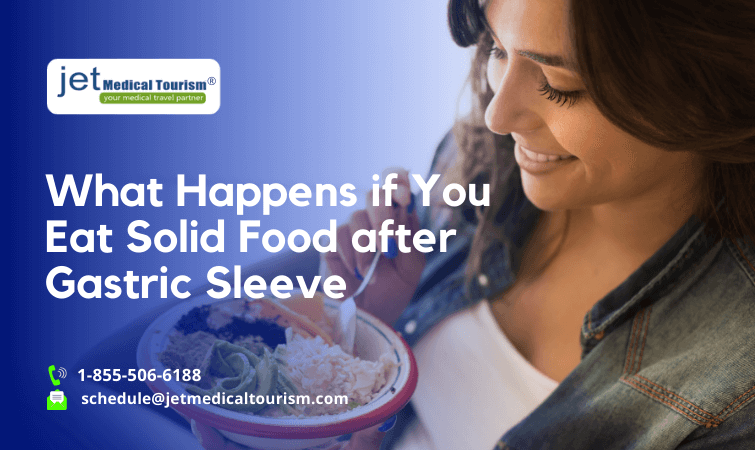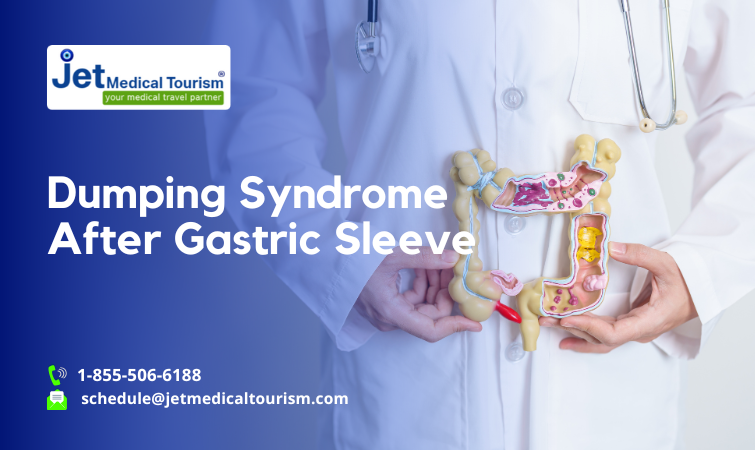What Happens if You Eat Solid Food after Gastric Sleeve
What happens if you eat solid food after gastric sleeve? This is one common concern among post-surgery patients. Gastric sleeve surgery is a popular weight loss procedure that involves removing a significant portion of the stomach to create a smaller, sleeve-shaped stomach pouch. This surgery is effective in helping individuals lose weight by limiting the amount of food they can consume. However, it also comes with strict dietary guidelines to ensure a successful and safe recovery.
Jet Medical Tourism is your trusted partner in the journey to a healthier and happier life. We specialize in providing top-quality gastric sleeve surgery in Tijuana, Mexico, offering a life-changing solution for individuals struggling to achieve their weight loss goals. Our mission is to empower our clients to take control of their health and transform their lives through safe, effective, and affordable weight loss surgery.
In this blog, we will explore the potential consequences of consuming solid food after gastric sleeve surgery and why it’s crucial to adhere to your surgeon’s recommendations.
How Long Should You Wait Before Eating Solid Food After Gastric Sleeve?
The timing for transitioning from liquid and pureed foods to solid foods after gastric sleeve surgery can vary depending on your surgeon’s recommendations and your individual progress. However, there is a general guideline that most patients follow. Typically, patients will follow a gradual progression that includes several phases of diet:
Clear Liquid Diet (Days 1-2)
Right after surgery, you’ll be on a clear liquid diet, which includes water, clear broth, sugar-free gelatin, and clear fruit juices. This phase helps keep you hydrated and allows your stomach to heal.
Full Liquid Diet (Days 3-14)
After the clear liquid phase, you’ll progress to a full liquid diet, which includes thicker liquids like protein shakes, low-fat yogurt, and creamed soups. This phase provides more nutrition but is still easy on your healing stomach.
Pureed Diet (Weeks 2-4)
Next, you’ll transition to pureed or mashed foods. These foods should be smooth and have a pudding-like consistency. Examples include pureed vegetables, lean ground meats, and cottage cheese.
Soft Diet (Weeks 4-6)
The soft diet includes foods that are soft, moist, and easy to chew. Examples include scrambled eggs, canned fruit, and soft-cooked vegetables.
Transition to Solid Foods (Weeks 6 and beyond)
The transition to solid foods typically occurs around weeks 6 to 8 post-surgery or as advised by your surgeon. Your surgeon or dietitian will provide specific guidance on which solid foods to introduce first and how to gradually incorporate them into your diet. You’ll want to start with very soft, well-cooked, and easily digestible foods, such as lean proteins and cooked vegetables. Over time, you can reintroduce a wider variety of solid foods, but it’s important to continue focusing on portion control and mindful eating.
It’s essential to follow your surgeon’s recommendations and attend follow-up appointments to monitor your progress. Your surgeon will assess your healing and readiness for each phase of the diet, including the introduction of solid foods. Rushing into solid foods too early can lead to complications, as mentioned in the previous response.
Remember that each person’s recovery is unique, so the timeline may vary. Your surgeon and healthcare team will provide personalized guidance based on your specific needs and progress. Always consult with your healthcare provider if you have any concerns or questions about your post-surgery diet and the timing of transitioning to solid foods.
Potential Risks and Complications of Eating Solid Food After Gastric Sleeve
Eating solid food too soon after gastric sleeve surgery can lead to various risks and complications, as the stomach is still healing and adjusting to its new, reduced size. It’s crucial to adhere to the recommended diet progression to minimize these risks. Here are some potential complications of consuming solid foods prematurely:
Nausea and Vomiting
Solid foods are more challenging to digest, especially in the early stages of recovery. Eating them too soon can lead to nausea and vomiting, which can be uncomfortable and may disrupt the healing process.
Food Obstruction
Solid food particles can become lodged in the narrowed portion of the stomach or the small intestine. This can result in a condition known as food obstruction, which causes severe abdominal pain, discomfort, and may require medical intervention to resolve.
Stomach Stretching
Gastric sleeve surgery reduces the size of the stomach to limit food intake. Eating solid foods prematurely can stretch the stomach pouch, making it larger and less effective in controlling portion sizes. This can ultimately lead to reduced weight loss results.
Dyspepsia and Discomfort
Solid foods may cause indigestion, bloating, and general discomfort when consumed too soon after surgery, as the stomach is still sensitive and adapting to its new size.
Reduced Weight Loss Success
The primary goal of gastric sleeve surgery is to aid in weight loss by restricting the amount of food that can be consumed. Eating solid foods prematurely can increase calorie intake, potentially leading to reduced weight loss success.
Nutritional Deficiencies
Solid foods are often higher in calories and less nutrient-dense than the foods recommended in the early stages of post-surgery diets. Consuming them too soon can lead to nutritional deficiencies if patients do not prioritize nutrient-rich foods.
Gastric Sleeve Complications
In some cases, consuming solid foods too early can contribute to complications related to the surgical site, such as leaks, infections, or bleeding. A healing stomach pouch is more susceptible to injury.
Tips to Follow When You Transition to Solid Foods
To ensure a smooth transition to solid foods after gastric sleeve surgery, consider these tips:
- Follow Your Healthcare Provider’s Guidance: Always follow your surgeon’s recommendations regarding diet progression and the timing of introducing solid foods.
- Start with Soft, Protein-Rich Foods: Begin with soft, easily digestible protein sources like lean poultry, fish, or tofu. Chew your food thoroughly to aid digestion.
- Portion Control: Pay attention to portion sizes and eat slowly. Listen to your body’s hunger and fullness cues.
- Avoid High-Calorie, Low-Nutrient Foods: Steer clear of empty-calorie foods, sugary treats, and processed snacks. Focus on nutrient-dense options.
- Stay Hydrated: Continue to drink plenty of water between meals to stay hydrated. Avoid drinking while eating to prevent overfilling your stomach.
Conclusion
Eating solid foods too soon after gastric sleeve surgery can have adverse effects on your health and weight loss progress. It’s essential to follow the recommended diet progression and guidelines provided by your healthcare team. Patience and adherence to these guidelines are key to achieving the long-term success you desire after this life-changing surgery. Always consult with your healthcare provider for personalized advice and support throughout your recovery journey.
Achieve Your Weight Loss Goals with Gastric Sleeve
Gastric sleeve surgery in Tijuana, Mexico offers a transformative solution that can lead to significant weight loss, improved health, and enhanced quality of life. Contact today to Take the first step towards a brighter future by choosing Jet Medical Tourism as your partner in your weight loss journey.


